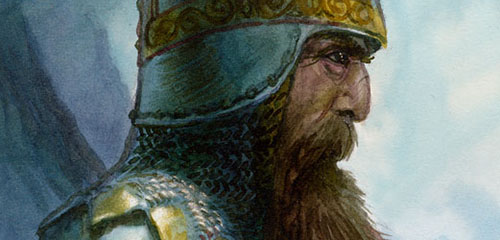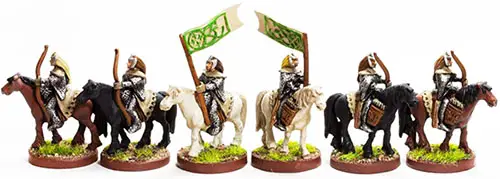
In a three- or four-player game, each player represents one of the major powers in The Lord of the Rings and controls some of the Nations and certain Characters.
Four-player Game
In a four-player game, the player responsibilities are broken down as follows:
Free Peoples:
- Player 1: Gondor (also controls the Elves)
- Player 2: Rohan (also controls the North and Dwarves)
Shadow:
- Player 1: The Witch-king (the Sauron Nation)
- Player 2: Saruman and Sauron Allies (Isengard and Southron & Easterling Nations)
All the rules in the standard game apply, with the following exceptions.
At the beginning of the game, the Gondor player and the Witch-king player take the "Leading Player" tokens.
At the beginning of each turn (excluding Turn 1), the Leading Player in a team passes the "Leading Player" token to his teammate.
Event Draw
On Turn 1, each player draws one card from each of their respective Event decks. On the following turns, each player draws one card from one Event deck of his choice.
After drawing cards, and discarding excess cards, players in the same team may agree to swap one of their cards with their teammate. The players cannot show or discuss the cards. They can only tell each other if they want to swap one card or not. A card is swapped only if both players agree.
In a four-player game, each player's hand limit is four cards instead of six.

Fellowship Phase
The Leading Player on the Free Peoples team decides whether to declare the Fellowship or not and who the Guide of the Fellowship is.
Hunt Allocation And Action Roll
The Leading Player on the Shadow team decides how many Action dice to place in the Hunt Box. The Leading Player of each team rolls the Action dice.
Action Resolution
The Free Peoples team goes first.
The non-Leading Player on the Free Peoples team chooses an Action die and uses it for any of the Nations he controls or for any action relating to the Fellowship or any individual Companions, such as moving or hiding the Fellowship or moving Companions on the map.
Then the non-Leading Player in the Shadow team uses an Action die, followed by the Leading Player on the Free Peoples team, and then the Leading Player on the Shadow team.
The actions are all taken in that order until both teams have used all of their Action dice.
If a player decides to pass an action, he is still entitled to take his next action after the opposing team has taken their action.
Limits On Actions
Each player only controls certain Nations and can only use his Action dice and Event cards to recruit, move, or fight with Armies of these Nations. Only the player who controls a Nation may move the Political counter of that nation, unless the special ability of a Character is used.
For rules concerning regions containing units of Nations controlled by both players on a team, see Mixed Armies, below.
Summary
Free Peoples
- The Gondor player controls the Gondor and Elven Nations.
- The Rohan player controls the Rohan, North, and Dwarven Nations.
- Any player may move or hide the Fellowship.
- Any player may move or separate Companions.
- The effects of the Hunt on the Fellowship are decided and applied by the Leading Player.
Shadow Armies
- The Witch-king player controls the Sauron Nation, the Witch-king, and the Mouth of Sauron.
- The Saruman and Sauron Allies player controls the Isengard and Southron & Easterling Nations, as well as Saruman.
- Any player may hunt the Fellowship.
- Any player may move the Nazgul, but only the Witch-king player may recruit new Nazgul.
- The number of Action dice allocated to the Hunt Box before the Action die roll is decided by the Leading Player.
Mixed Armies

If, after an action, units and Leaders controlled by different players are in the same region, they may remain as separate Armies or a mixed Army can result.
If the Armies remain separate, each player keeps the control of his own units and Leaders. If the total number of units of the two Armies exceeds the stacking limit, the players must remove one unit each, starting with the non-Leading player, until the limit is respected.
The troops of the two players may become a mixed Army if both players agree to this; they must become a mixed Army if the region is attacked.
The controlling player of a mixed Army is the player who controls the highest number of Army units in the region. In the case of a tie, the player with the highest number of Elite units is the controlling player. If there is still a tie, the current Leading Player is the controlling player.
Only the controlling player may use actions to move or attack with the mixed Army, and play Combat cards for that Army.
If the number of units changes, the control of the mixed Army may be transferred to the other player. Note, however, that the controlling player may not deliberately split an Army (during either movement or attack) so that he loses the control of the acting Army.
A player may regain control of his units in a mixed Army by simply using an action to move these units out of the region with the mixed Army.
A mixed Army is still subject to the political restrictions (such as not being able to move across another border) of any non-belligerent Nation that is part of a mixed Army.
Events
Normally, Event cards can only be used by a player if they apply to a Nation or Characters they control. The icon in the lower right corner of the Event portion of a card indicates which player may use that card.
Cards that do not have an icon may be used by any player as appropriate.
Player Icons

Southron & Easterling Elite Units
In a multiplayer game, when Saruman is in play, each Southron & Easterling Elite unit, as well as each Isengard Elite unit, is considered a Leader as well as an Army unit for all movement and combat purposes.
Three-player Game
The three-player game uses the same rules as the four- player game, but there is only one Free Peoples player, who plays normally as in a standard two-player game, with the following exception:
The Free Peoples player cannot use two consecutive actions on the same Nation (e.g., he cannot use two consecutive actions to recruit and move Gondor troops).
He can use two consecutive actions on mixed Armies but not on the same individual Army (e.g., he can move a Gondor Army once and then a Gondor/Rohan Army, but cannot act twice with the same Gondor/Rohan Army).
Victory Conditions
Each team wins as in the two-player game. To assess individual victory within a team:
If the Shadow team wins, count the Victory point value of Strongholds and Cities captured by the Nations of each Shadow player and subtract the Victory points of Strongholds and Cities they lost. The player with the highest total wins.
If the Free Peoples team wins, the player who lost fewer Victory points for Strongholds and Cities conquered by the Shadow wins.
Continue Reading


